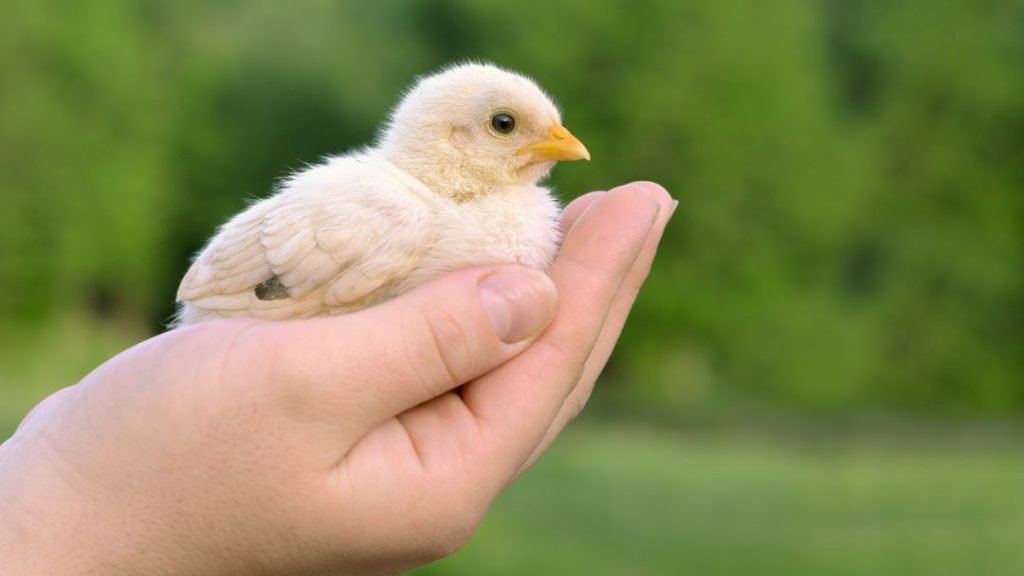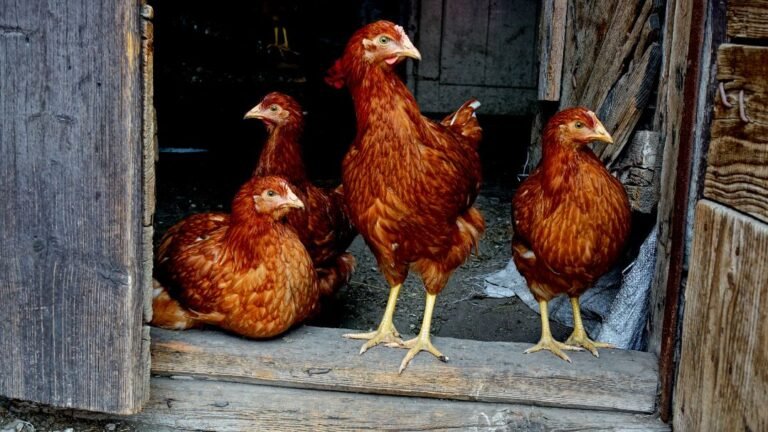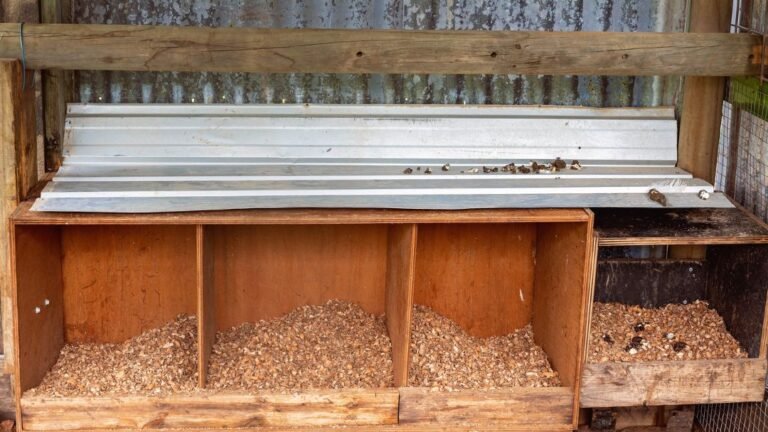Baby chick care involves providing proper shelter, warmth, food, and water for the chicks. These newborn birds need a suitable brooder box with a heat source, such as a heat lamp or heating pad, as well as a constant supply of fresh water and nutritionally balanced feed to support their growth and development.
Additionally, it is essential to regularly clean the brooder box, monitor the chicks for any signs of illness, and gradually introduce them to the outdoor environment as they mature.
By following these guidelines, you can ensure the well-being and healthy development of your baby chicks.
Preparing For Baby Chicks
Preparing for baby chicks involves providing a safe and warm environment, proper nutrition, clean water, and regular monitoring of their health and well-being. Ensuring these essential elements are in place will help you give the best care to your baby chicks.
Whether you’re a seasoned farmer or a first-time poultry enthusiast, preparing for the arrival of baby chicks is an exciting and rewarding endeavor. Taking the time to properly prepare their brooder area and gather the necessary equipment and supplies is essential for their health and well-being.
In this section, we will explore three key aspects of preparing for baby chicks: choosing the right breed for your needs, setting up a safe and comfortable brooder area, and gathering essential equipment and supplies for chick care.
Choosing The Right Breed For Your Needs
- Consider the purpose: Determine whether you are raising chicks for egg-laying, meat production, or simply as pets.
- Climate suitability: Research breeds that are well-adapted to your local climate, ensuring their ability to thrive in your area’s temperature and weather conditions.
- Space requirements: Evaluate the availability of space you can provide for your chicks. Some breeds are more suitable for confinement, while others require more room to roam.
- Temperament: Assess the temperament of various breeds to find those that align with your preferences and intended purpose.
Setting Up A Safe And Comfortable Brooder Area
- Location: Choose a well-ventilated space that is protected from extreme temperatures, drafts, predators, and household pets.
- Temperature control: Maintain a consistent temperature in the brooder area, starting around 95°F for the first week and gradually decreasing by 5°F each week until reaching the ambient temperature.
- Bedding: Provide a suitable bedding material, such as straw, wood shavings, or paper towels, that is comfortable and absorbent for your chicks.
- Lighting: Ensure a 24-hour light source, preferably using a heat lamp, to mimic natural daylight and assist with chick growth and development.
- Space and equipment: Create enough space for each chick to allow them to move around freely. Provide easy access to feeders, waterers, and perches within the brooder area.
Essential Equipment And Supplies Needed For Chick Care
- Brooder box: Use a sturdy and secure brooder box or enclosure that prevents chicks from escaping and predators from entering.
- Heat source: Invest in a reliable heat lamp or brooder plate to maintain the appropriate temperature for the chicks.
- Feeder and waterer: Provide chick-specific feeders and waterers that are easily accessible and kept clean to prevent contamination.
- Chick feed: Purchase the appropriate chick starter feed, specifically formulated to provide the necessary nutrients for healthy growth and development.
- Grit and supplements: Consider offering chick grit and necessary supplements, such as vitamins or probiotics, to support their digestive health.
- Thermometer: Use a reliable thermometer to monitor the temperature within the brooder area and ensure it remains within the appropriate range.
- First aid supplies: Keep a well-stocked first aid kit with items like poultry electrolytes and antiseptic solutions for any potential health issues.
By carefully considering the breed, creating a safe and comfortable brooder area, and acquiring the necessary equipment and supplies, you can ensure a successful and enjoyable experience in caring for your baby chicks. Following these preparatory steps will contribute to their well-being and set the stage for healthy growth and a prosperous chicken-raising journey.

Ensuring Proper Nutrition
To provide proper nutrition for baby chick care, it is crucial to ensure a balanced diet rich in essential nutrients. This aids in their growth, overall health, and development. Providing a well-rounded feed and supplementing it with fresh water is key to maintaining their well-being.
Selecting The Right Chick Feed For Optimal Growth And Development
- Choosing the correct chick feed is crucial for ensuring proper nutrition and promoting optimal growth and development.
- Look for a feed specifically formulated for baby chicks, as this will provide them with the essential nutrients they need during this critical stage of their life.
- Opt for a feed that is high in protein, as this is essential for muscle and tissue development. Look for a feed that contains around 18-20% protein.
- Make sure the chick feed is well-balanced and contains all the necessary vitamins and minerals. This will help support their immune system and overall health.
- Avoid feeds that are meant for adult chickens, as they may not provide the appropriate nutrition for young chicks.
- It’s important to provide a consistent supply of fresh chick feed, ensuring that it is always available in their feeder.
- Consider purchasing organic or non-GMO chick feed if you prefer to avoid additives and chemicals.
Providing Access To Clean Water At All Times
- Alongside the proper nutrition from chick feed, it is crucial to provide baby chicks with constant access to clean and fresh water.
- Use a shallow waterer or chick-specific waterer to make it easy for them to drink without the risk of drowning.
- Ensure the waterer is cleaned and refilled regularly to maintain cleanliness and freshness.
- Avoid using cold water straight from the tap as it may cause stress or discomfort to the chicks. Instead, use lukewarm or room-temperature water.
- Keep an eye on the water level throughout the day to ensure it doesn’t run out. Baby chicks have a higher water requirement compared to adult chickens.
Supplementing Their Diet With Nutritious Treats
- In addition to the chick feed, it’s beneficial to supplement the chick’s diet with nutritious treats.
- Select treats such as finely chopped greens, fruits, or small insects to provide variety and additional nutrients.
- Treats should be introduced gradually and in moderation to prevent digestive issues. Start with small portions and observe how the chicks respond.
- Avoid giving them treats that are high in sugar, salt, or any harmful additives.
- Pay attention to the size and consistency of the treats to prevent choking hazards. Ensure everything is finely chopped or mashed.
Remember, proper nutrition is essential for the healthy growth and development of baby chicks. Provide them with a well-balanced chick feed, fresh and clean water at all times, and occasional nutritious treats. By following these practices, you will provide the best care for your baby chicks and set them on the path to a healthy and vibrant life.
Creating A Healthy Environment
Caring for baby chicks is crucial in creating a healthy environment. Provide proper nutrition, warmth, and cleanliness to ensure their well-being and growth.
Maintaining the ideal temperature and humidity levels in the brooder:
- The brooder temperature should be kept at around 95°F (35°C) during the first week. Gradually decrease the temperature by 5°F (2.8°C) each week until the chicks are fully feathered.
- Use a heat lamp or a brooder plate to provide warmth and make sure the chicks have enough space to move away from the heat source if they feel too warm.
- Measure the temperature using a thermometer placed at chick level to ensure accuracy.
- Adjust the brooder temperature as needed to prevent overheating or chilling of the chicks.
- Humidity is crucial for chick health and development. Aim for 50-60% humidity during the first week, gradually decreasing it to 40-50% in the following weeks.
- Use a hygrometer to monitor humidity levels and adjust accordingly using water containers or humidifiers.
Managing ventilation to prevent respiratory issues:
- Proper ventilation is essential to maintain fresh air and prevent respiratory problems in baby chicks.
- Ensure there is good air circulation in the brooder, but avoid drafts that can cause chilling.
- Use mesh or wire mesh walls for the brooder to allow for proper airflow.
- Regularly clean the brooder to remove any accumulated dust or debris that can hamper air quality.
- Keep the brooder away from other pets or sources of pollutants that may compromise air quality.
Implementing proper sanitation practices to avoid disease transmission:
- Clean the brooder thoroughly before introducing the chicks. Use a mild disinfectant and allow it to fully dry before adding new bedding.
- Provide clean and dry bedding such as wood shavings or straws. Replace the bedding regularly to maintain cleanliness.
- Ensure that waterers and feeders are clean and free from any contaminants. Regularly check and clean them to prevent the growth of harmful bacteria.
- Practice good hygiene when handling the chicks and their supplies. Wash your hands before and after handling the chicks to avoid the spread of germs.
- Quarantine any sick chicks and seek professional advice if necessary to prevent the spread of disease to other chicks.
By carefully maintaining the ideal temperature and humidity levels in the brooder, managing ventilation to prevent respiratory issues, and implementing proper sanitation practices, you can create a healthy environment for your baby chicks. This will help ensure their well-being and reduce the risk of disease transmission.
Remember to monitor the conditions regularly and make necessary adjustments to provide the best possible care for your feathered friends.
Promoting Socialization And Mental Stimulation
Promote socialization and mental stimulation with proper baby chick care, ensuring their well-being and growth. Create an environment that encourages interaction and engages their minds, fostering healthy development.
Encouraging Social Interaction Between Chicks
- It is crucial to ensure that baby chicks are provided with opportunities for socialization as it helps promote their overall well-being and mental development.
- Social interaction between chicks can be fostered by:
- Co-housing: Keeping chicks together in a suitable brooder space allows them to interact, learn from each other, and form bonds.
- Introducing new chicks: Gradually introducing new chicks to an existing group encourages social integration and reduces stress.
- Supervised playtime: Allowing supervised playtime outside of the brooder box enables chicks to explore, interact, and establish pecking orders.
- Mirror effect: Placing a small mirror inside the brooder box provides chicks with a reflection and can stimulate social behavior.
Providing Opportunities For Physical Exercise
- Physical exercise is essential for the growth and development of baby chicks as it promotes good health and strengthens their muscles.
- Ways to provide opportunities for physical exercise include:
- Sufficient space: Ensuring chicks have enough space in the brooder box to move around, stretch their wings, and engage in natural behaviors.
- Outdoor exploration: Allowing supervised outdoor time in a secure area lets chicks experience natural elements, such as grass and sunlight, encouraging physical activity and exploration.
- Obstacle courses: Setting up a mini obstacle course inside the brooder box using safe materials like cardboard tubes or low platforms encourages chicks to climb, jump, and exercise.
- Perching: Providing perches or branches at various heights within the brooder box allows chicks to practice balance and develop their leg muscles.
Enriching Their Environment With Toys And Perches
- Enriching the environment of baby chicks with toys and perches helps stimulate their minds, prevent boredom, and promote healthy growth.
- Consider the following when enriching their environment:
- Chew toys: Providing safe, non-toxic chew toys like small pieces of untreated wood or natural fibers can satisfy chicks’ natural pecking behavior and keep their beaks healthy.
- Foraging toys: Introducing simple foraging toys, such as scattering small treats or food pieces in the bedding, encourages chicks to search, peck, and explore, stimulating their natural instincts.
- Perches: Offering various perches of different heights or materials inside the brooder box allows chicks to perch, improving their balance, coordination, and leg strength.
- Feather dusters: Hanging a feather duster or soft toy from the top of the brooder box provides chicks with a target for play, promoting their motor skills and coordination.
Remember to observe the chicks closely for safety and remove any potential hazards from their environment. By implementing these strategies, you can effectively promote socialization and mental stimulation for your baby chicks, ensuring their healthy development.
Monitoring Health And Identifying Problems
Keeping a watchful eye on the health and well-being of your baby chicks is essential to ensure they grow into happy and thriving adult chickens. By conducting regular health checks and monitoring their behavior closely, you can swiftly identify any potential issues that may arise.
In this section, we will discuss how to conduct health checks and recognize common health problems, along with their corresponding remedies. Remember, if needed, veterinary assistance should always be sought for professional advice and guidance.
Conducting Regular Health Checks And Monitoring Chick Behavior
To effectively monitor the health of your baby chicks, here are some key points to consider:
- Observe their appetite: Healthy chicks will eagerly peck at their food and water. A sudden loss of appetite can be an early sign of an underlying health issue.
- Check for cleanliness: Ensure the brooder area is clean and dry. Dirty feathers or feces may indicate the presence of parasites or digestive problems.
- Examine their physical appearance: Look for any abnormalities such as open wounds, feather loss, or swelling. Unusual physical traits might signal a health problem.
- Monitor body temperature: Chicks should feel warm to the touch, and their bodies should be evenly covered with feathers. Cold or overheated chicks may require adjustment to their brooder conditions.
Identifying Common Health Issues And Their Remedies
Despite your best efforts, baby chicks may encounter health issues. Here are some common problems to watch out for and their possible remedies:
- Pasty butt: This condition occurs when chicks’ droppings get stuck to their vent area, preventing normal elimination. To address this, gently clean the affected area with warm water and a soft cloth, being careful not to pull out the feathers.
- Spraddle leg: This condition causes chicks to splay their legs sideways, making it difficult for them to walk or stand. Supporting their legs with leg splints and providing proper bedding can help correct this issue.
- Coccidiosis: A common intestinal infection, coccidiosis can be identified by symptoms such as diarrhea, dehydration, and lethargy. Consult a veterinarian for appropriate medication and preventive strategies.
- Respiratory infections: Wheezing, sneezing, nasal discharge, and labored breathing are signs of respiratory infections. Quarantine infected chicks, improve ventilation and seek veterinarian guidance for proper treatment.
- Vitamin deficiencies: Insufficient access to essential vitamins can lead to weak bones or poor growth. Provide a balanced chick starter feed supplemented with vitamins as necessary, ensuring they receive proper nutrition.
Seeking Veterinary Assistance When Necessary
While proactive care greatly reduces the risk of health issues, it is crucial to seek veterinary assistance when needed. If you notice any severe or persistent symptoms, consult a poultry veterinarian for accurate diagnosis and appropriate treatment. Professional guidance can provide invaluable support in maintaining the health and well-being of your baby chicks.
By diligently conducting regular health checks, promptly identifying common health issues, and seeking veterinary assistance when necessary, you can ensure that your baby chicks grow into healthy and thriving adult chickens. In the next section, we will explore the essential aspects of providing proper nutrition to support their growth.
Transitioning Chicks To The Coop
Transitioning chicks to the coop requires proper care and preparation. Learn essential tips and techniques to ensure a smooth and successful transition for your baby chicks.
Introducing chicks to the existing flock gradually:
- Gradual It is crucial to introduce the chicks to the existing flock gradually to minimize stress and potential conflicts.
- Separate area: Initially, provide a separate area within the coop or a separate brooder adjacent to the coop.
- Visual contact: Allow the chicks and older chickens to see each other without direct contact. This helps them get used to one another’s presence.
- Short supervised visits: Once the chicks are a few weeks old and strong enough, carefully supervise short visits for them to explore the coop together with the older flock.
- Increased exposure: Gradually increase the duration and frequency of these supervised visits to enable the chicks to learn from the older chickens.
Preparing the coop for a smooth transition:
- Enough space: Ensure that the coop has sufficient space to accommodate all the chickens comfortably. Each bird needs around 4 square feet of coop space.
- Proper bedding: Lay clean and absorbent bedding material on the floor of the coop. This helps keep the area dry and provides a comfortable surface for the chicks.
- Nesting boxes and perches: Install enough nesting boxes and perches at different heights to accommodate all the chickens. This allows them to establish their own space and reduces potential conflicts.
- Adequate ventilation: Maintain proper ventilation in the coop to keep the air fresh and prevent the buildup of ammonia. This contributes to a healthier environment for the chicks and older chickens.
- Secure fencing: Ensure that the coop and the outdoor area are securely fenced to protect the chicks from predators and prevent them from wandering off.
Monitoring chick integration and resolving conflicts:
- Observation: Keep a close eye on the flock during the integration process. Observe their behavior and interactions to ensure their well-being.
- Normal pecking order: Chickens establish a pecking order, and some pecking and chasing are normal. However, intervene if any bird becomes excessively aggressive or if the pecking causes injury.
- Providing hiding spots: Place temporary barriers or hiding spots within the coop to give the chicks a chance to escape the older chickens if needed.
- Supervised integration: Allow the chicks and older chickens to free-range together under supervision. This promotes socialization and establishes a sense of belonging within the flock.
- Proper nutrition: Offer a balanced diet with adequate nutrients for all the chickens, ensuring the chicks receive appropriate feed for their age and development. Good nutrition helps with overall health and reduces aggression.
Remember, the key to successfully transitioning chicks to the coop is gradual integration, adequate space, proper preparations, and close monitoring. By following these steps, you can help your chicks integrate seamlessly into the existing flock and ensure a happy and harmonious coop environment.
Celebrating Milestones And Growth
As your precious baby chicks continue to grow, it is important to document their important developmental milestones, engage them in supervised outdoor exploration and foraging, and prepare them for the transition to adult chicken care. By focusing on these aspects, you can ensure the healthy development and well-being of your chicks.
Documenting Important Developmental Milestones
- Observe and record the hatching process: Witnessing the magical moment when a chick cracks through its shell is an incredible experience. Capture this milestone by taking photos or videos to preserve the memory.
- Track physical growth: Regularly measure and record the chicks’ weight, height, and wingspan to monitor their physical development. This aids in identifying any growth issues or health concerns.
- Monitor feather growth: Keep an eye on the progress of your chicks’ feather development, from the emergence of fluffy down to the growth of adult feathers. Documenting these changes provides a fascinating insight into their growth journey.
Engaging In Supervised Outdoor Exploration And Foraging
- Create a safe outdoor environment: Set up a secure outdoor enclosure where your chicks can explore under your watchful eye. Ensure it is predator-proof and escape-proof, with access to shade, water, and natural elements.
- Encourage natural foraging behavior: Scatter some treats or feed in the outdoor area to stimulate the chicks’ natural foraging instincts. This allows them to learn how to find food, peck at the ground, and scratch in search of insects.
- Promote social interaction: Supervised outdoor time provides an opportunity for your chicks to interact with adult chickens, strengthening their social skills and integrating them into the flock gradually.
Preparing For The Transition To Adult Chicken Care
- Gradual introduction to adult feed: Around the age of 6-8 weeks, begin the transition from starter feed to grower feed, gradually mixing the two types. This helps chicks adjust to the new feed without digestive issues.
- Ensuring appropriate shelter: As your chicks grow, make sure their shelter accommodates their increasing size. Provide ample space, roosting bars, nesting boxes, and proper ventilation to promote their well-being.
- Preparing for coop life: Start introducing your chicks to the coop environment, allowing supervised visits before they are ready to live there full-time. Gradually familiarize them with the coop, nesting boxes, and roosting bars.
By documenting milestones, encouraging outdoor exploration, and preparing for the transition to adult chicken care, you are setting the foundation for healthy growth and development for your baby chicks. Cherish every moment as they grow and thrive in their journey from adorable fluffballs to happy, fully-grown chickens.
Conclusion
Taking care of baby chicks is a rewarding and fulfilling experience that requires careful attention and dedication. By providing them with a warm and safe environment, a balanced diet, and regular healthcare, you can ensure their growth and well-being. Remember to handle them gently and socialize them with other chicks for optimal development.
Keeping their living space clean and comfortable is also important to prevent diseases and promote their overall health. Monitoring their behavior and understanding their needs will help you spot any issues and address them promptly. As they grow, you will witness their playful and curious personalities shine through.
The bond that forms between you and your baby chicks is truly special. So, roll up your sleeves, put your love and care into their upbringing, and enjoy the journey of raising these adorable creatures.



